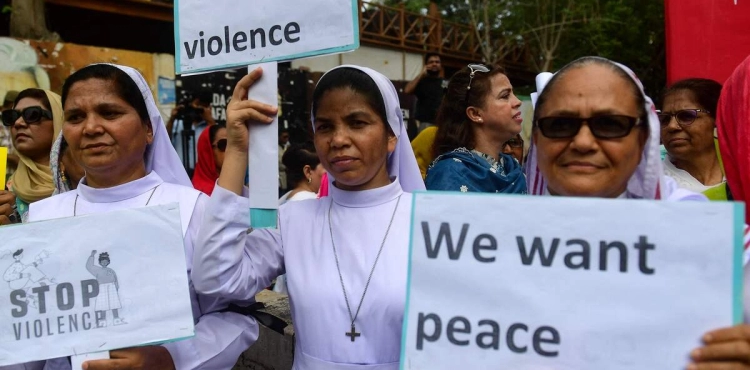Blasphemy is a sensitive issue in Muslim-majority Pakistan, where angry mobs have killed people over accusations of insulting Islam or the Prophet Muhammad.
Violence erupted this week when mobs stormed the Garanwala district on the outskirts of the industrial city of Faisalabad, after accusations spread by Christians of desecrating the Koran. Families were forced to flee after an attack by hundreds of Muslim residents, who burned and destroyed churches and homes.
Since 1990, at least 85 people have been killed in connection with allegations of blasphemy, according to local media and researchers.
This includes individuals accused of blasphemy and their children, in addition to lawyers and judges who were hearing their cases and others.
Among the dead were people belonging to religious minorities, prominent politicians, students, clerics and mentally ill people.
They were burned to death or hanged by a mob, shot in courtrooms or beaten to death.
Since Punjab Governor Salman Taseer was shot dead by his bodyguard over a call for reform of blasphemy laws in 2011, discussion of the issue has become almost impossible.
Today, false accusations of blasphemy are being leveled as a means of pressure on opponents, including senior politicians.
Taseer's killer was lauded by many, and his assassination was followed by the rise of the Islamist Tehreek-e-Labaik Pakistan, a far-right party that enjoys widespread support and calls for the beheading of blasphemers.
Blasphemy cases, which are presented on ideological grounds, have increased since the rise of this party.
Muslims make up the majority of those accused of blasphemy in Pakistan. But members of religious minorities face a particularly acute threat, according to rights groups.
Christians, who make up about 2% of the population, are among the poorest in Pakistani society, and are often subjected to fabricated and baseless accusations of blasphemy, which can be used to settle personal scores.
And whenever violence and riots broke out on the grounds of blasphemy, the local police were seen standing by and allowing the crowds to carry out their attacks. The reason is that its members fear that they will be considered "blasphemers" if they prevent extrajudicial executions.
Pakistan's blasphemy laws, some inherited from former British colonialism, were of little use until the 1970s and 1980s, when they were tightened and expanded to include several provisions insulting Islam.
According to the US Commission on Religious Freedom, there are at least 53 people detained across Pakistan on blasphemy charges.
Judges handling blasphemy cases reported being pressured to issue rulings regardless of the evidence, for fear that they would be subjected to physical violence if they did not.
Under existing laws, which were tightened again this year, the offense of insulting the Prophet is punishable by death, while "desecration" of the Koran is punishable by life imprisonment.












